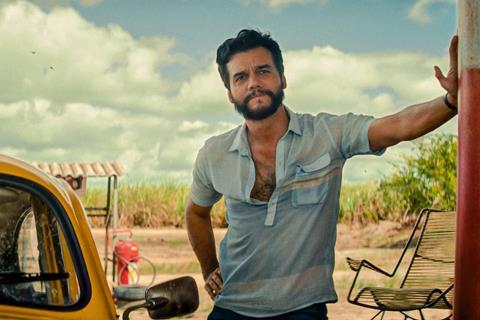The director’s anarchic follow-up to ‘Bacarau’ stars Wagner Moura and Udo Kier

Dir/scr: Kleber Mendonça Filho. Brazil/France/Germany/Netherlands. 2025. 160mins
Brazil, 1977. A left-leaning academic and technology expert flees a powerful enemy, returning to the place of his birth – the state of Pernambuco in northeast Brazil – under the assumed name of Marcelo (Wagner Moura). He’s hoping to escape with his young son, but the city of Recife is even wilder than usual, the carnival is in full swing, the body count is mounting and the sharks (both literal and metaphorical) are circling. The fourth fiction feature from Kleber Mendonça Filho is a sweat-saturated riot of a movie: a dual-timeline thriller powered by the kind of anarchic, erratic energy that you would expect to find at the end of a two day bender.
A sweat-saturated riot of a movie
Unfolding largely in the late seventies, it is set slightly later than Walter Salles’ I’m Still Here but shares the rumbling backdrop of the military dictatorship. It’s a period of ’great mischief’, according to an opening title. Mischief seems something of an understatement for a wildly enjoyable film which starts with a corpse on the sidewalk and clocks up plenty more by the end. But ‘mischief’ is a well-chosen word, capturing the agile wit of Mendonça Filho’s approach to the film. Tonally, The Secret Agent is an unexpected blend of the bloody gusto of Bacurau and the more thoughtful approach of the director’s most recent picture, the documentary Pictures Of Ghosts, with its fascination with archives, oral histories and the cinemas that once stood in the towns and cities of Brazil.
The film takes time piecing together Marcelo’s story and the nature of the threat to his safety. But he’s an immediately likeable character, a man who refuses to carry a gun but who is armed with considerable charm. After he negotiates the jackals of the local police and cavorting carnival monsters, his arrival in Recife feels like a homecoming.
Marcelo is welcomed into a covert community of refugees (although they prefer not to use that word) from elsewhere in Brazil and further afield: there’s a couple from Angola. It’s a family of sorts, presided over by 77-year-old den mother Dona Sebastiana. But the presence in the apartment block of a ‘Janus cat’, a feline congenital deformity which means that the animal is born with two faces, is perhaps a hint that not everything in the city can be trusted.
Marcelo takes temporary work in an official Identification Records Office, partly as cover and partly to seek out a record of his mother’s life. One of the themes that the film explores is the way in which wealth and privilege disproportionately impacts on a person’s historical legacy – some lives leave a substantial mark and others are erased; some voices are heard and others are silenced.
At the office, Marcelo has the dubious honour of being taken under the wing of the local police chief, Euclides (Roberio Diogenes). That Euclides is corrupt goes without saying – he knows rather more than he’s letting on about a human leg which has been found in the belly of a shark. But he takes a liking to Marcelo, hauling him off during his lunch break to meet German exile Hans (Udo Kier), to admire his collection of bullet scars. It’s an odd scene, and one which doesn’t add much to the picture apart from an anxiety spike in the building tension.
Woven into the film are several contemporary segments, including a slightly underpowered final coda. We meet a young academic researcher (Laura Lufesi) who is transcribing C90 cassette recordings of interviews from the late 70s, including some which explain Marcelo’s predicament. She becomes fascinated by his story and his fate.
The use of the cassette tapes is just one element that contributes to the richly textured sense of time and place. Mendonça Filho shot the picture, like Bacurau, in anamorphic Panavision, and it looks terrific. The colours are swimming and saturated; the light has a lightly beach-bronzed quality. Music is a pulsing mash-up of Brazilian carnival stompers and a few American tracks. And the overheated urban legends of the time – allegories for the oppressive regime – are brought to life in a gloriously odd sequence in which a disembodied zombie leg terrorises the locals in a late-night hook-up park.
Production companies: Cinemascopio Producoes
International sales: MK2 pauline.maghnaoui@mk2.com
Producer: Emilie Lesclaux
Cinematography: Evgenia Alexandrova
Production design: Thales Junqueira
Editing: Eduardo Serrano, Matheus Farias
Music: Tomaz Alves Souza, Mateus Alves
Main cast: Wagner Moura, Maria Fernanda Candido, Gabriel Leone, Carlos Francisco, Alice Carvalho, Roberio Diogenes, Hermila Guedes, Igor De Araujo, Italo Martins, Laura Lufesi, Udo Kier, Roney Villela, Isabél Zuaa























